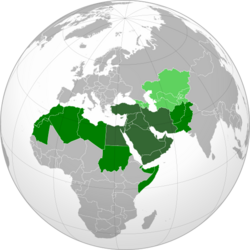Social:Greater Middle East
 | |
| Countries | UN members (36) and UN observer (1)
Other de facto countries (5)
|
|---|---|
| Dependencies | External (1)
Internal (6)
Occupied (5)
UN buffers (2)
|
| Largest cities | |
The Greater Middle East is a political term introduced in March 2004 in a paper published by the Carnegie Endowment for International Peace as part of the U.S. administration's preparatory work for the Group of Eight summit of June 2004. The area denotes a vaguely defined region called the "Arab world" together with Afghanistan, Iran, Pakistan , and Turkey with the speculation of including other Muslim-majority countries such as Indonesia, Bangladesh and the Central Asian countries of Uzbekistan, Kazakhstan, Kyrgyzstan, Turkmenistan and Tajikistan.[2] The paper presented a proposal for sweeping change in the way the West deals with the Middle East and North Africa.[3][4]
Adam Garfinkle of the Foreign Policy Research Institute defined the Greater Middle East as the MENA region together with the Caucasus and Central Asia.[5]
The future of the Greater Middle East has sometimes been referred to as the "new Middle East", first so by U.S. Secretary of State Condoleezza Rice, who presented the second-term Bush administration's vision for the region's future in June 2006 in Dubai. Rice said would be achieved through "constructive chaos", a phrase she repeated a few weeks later during a joint press conference with Israeli Prime Minister Ehud Olmert when the 2006 Lebanon War had broken out; the meaning of this phrase and the Bush administration's vision have been much debated since.[6][7][8] The efforts to achieve this new Middle East are sometimes called "The Great Middle East Project".[9][10]
Former U.S. National Security Advisor Zbigniew Brzezinski stated that a "political awakening" is taking place in this region which may be an indicator of the multipolar world that is now developing. He alluded to the Greater Middle East as the "Global Balkans", and as a control lever on an area he refers to as Eurasia.[11][page needed] According to Andrew Bacevich's book America's War for the Greater Middle East (2016), this region is the theater for a series of conflicts dating back to 1980, which heralded the start of the Iran–Iraq War.[citation needed]
See also
- West Asia
- Arab world
- Demographics of the Middle East and North Africa
- Great Game
- Middle East and North Africa (MENA)
- Muslim world
- Project for the New American Century
- Sykes–Picot Agreement
- The Grand Chessboard
References
- ↑ "World City Populations 2022". https://worldpopulationreview.com/world-cities.
- ↑ "The Greater Middle East Initiative" (in en). https://www.aljazeera.com/news/2004/5/20/the-greater-middle-east-initiative.
- ↑ Perthes, V., 2004, America's "Greater Middle East" and Europe: Key Issues for Dialogue , Middle East Policy, Volume XI, No.3, Pages 85–97.
- ↑ Ottaway, Marina & Carothers, Thomas (2004-03-29), The Greater Middle East Initiative: Off to a False Start , Policy Brief, Carnegie Endowment for International Peace, 29, Pages 1–7
- ↑ Garfinkle, Adam (December 1, 1999). "The Greater Middle East 2025". Foreign Policy Research Institute. https://www.fpri.org/article/1999/12/the-greater-middle-east-2025/.
- ↑ Kamal, Baher (December 14, 2015). "Silence, Please! A New Middle East Is in the Making". http://www.ipsnews.net/2015/12/silence-please-a-new-middle-east-is-in-the-making.
- ↑ Yadgar, Yaacov (July 2016). "A Myth of Peace: 'The Vision of the New Middle East' and Its Transformations in the Israeli Political and Public Spheres". Journal of Peace Research 43 (3): 297–312. doi:10.1177/0022343306063933.
- ↑ Jumana Al Tamimi (10 August 2013). "The 'New Middle East' and its 'constructive chaos'". Gulf News. https://gulfnews.com/world/americas/the-new-middle-east-and-its-constructive-chaos-1.1218872.
- ↑ ""Great Middle East Project" Conference by Prof. Dr. Mahir Kaynak and Ast.Prof. Dr. Emin Gürses in SAU". http://www.sakarya.edu.tr/en/?nid=237.
- ↑ "Turkish Emek Political Parties". http://www.emep.org/index.php?option=com_content&view=article&id=155:-the-greater-middle-east-project-the-new-name-for-occupation-and-re-division&catid=47:articles&Itemid=98.
- ↑ Zbigniew Brzezinski, "The Grand Chessboard: American Primacy and Its Geo-strategic Imperatives" Cited in (Nazemroaya, 2006).
External links
- "Greater Middle East: The US plan"
- "The Greater Middle East Initiative: Sea Island and Beyond (U.S. Senate)"
- "Blood Borders: How a better Middle East would look"
- A legacy of U.S. military failure in the Middle East over the past three decades"
 |

